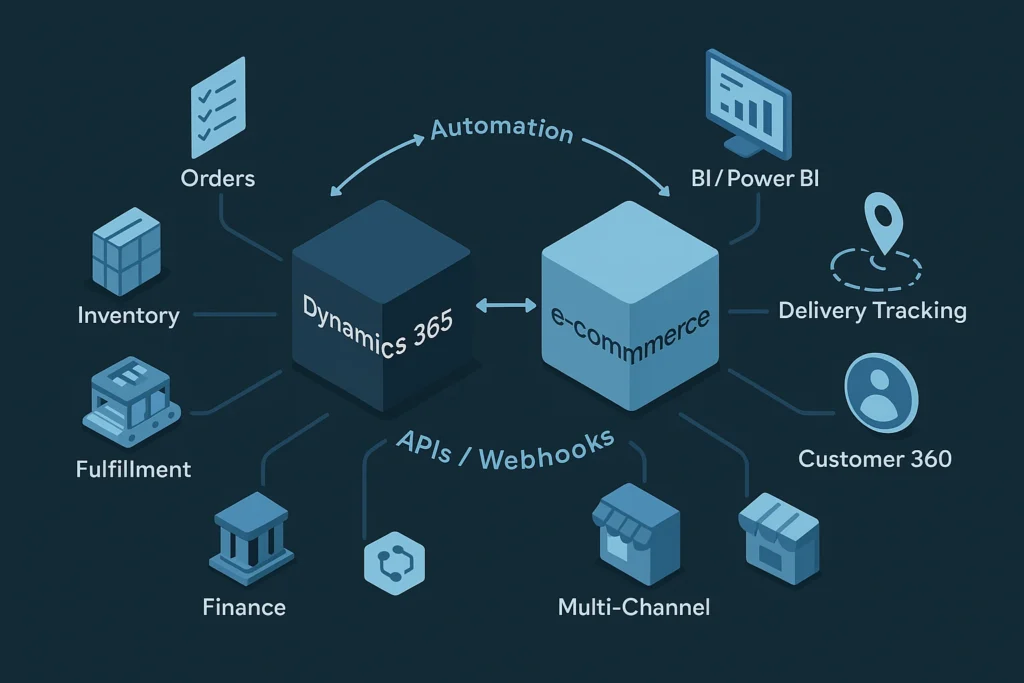The Top Benefits of Connecting Dynamics 365 with your ecommerce Platform
In the current, over-competitive digital market, operating an ecommerce store is not a matter of selling online alone. It is concerning providing smooth, customized and efficient customer experiences. The challenge? Majority of businesses have a scattered system. They have sales system, inventory system, and finance system.
This disintegration is normally associated with inefficiencies, mistakes and lost opportunities. It is then that Microsoft Dynamics 365, the collection of Microsoft ERP and CRM software, comes in as a game-changer. Combining your ecommerce platform (Shopify, Magento, WooCommerce, Amazon, etc.) with Dynamics 365, you can form a coherent ecosystem that facilitates the process of operations and prepares the smarter decisions.
Now, we are going to explore the top benefits or best advantages of integrating Dynamics 365 with your ecommerce service.
1. Seamless Order Management
It consumes time and prone to errors to manually transfer order details in your online store to back-end systems. With integration:
- Orders are automatically synchronized in Dynamics 365.
- Warehouse teams are provided with real time fulfilment requests.
- Customer can get real time delivery and tracking.
Scenario/Example: One of your Shopify store customers buys a laptop. In a few seconds, the order is reflected in Dynamics 365, inventory is updated, shipping is initiated, and no one interferes.
2. Inventory Visibility in Real-Time
Among the largest ecommerce headaches are inventory mismatches. Overselling will result in money back and dissatisfied clients, whereas overstocking will consume profits.
Dynamics 365 integration will provide:
- Online channel real-time stock synchronization.
- Automatic notifications in case of low inventory.
- More intelligent demand forecasting using past sales information.
This implies that the customers never feel bad/wrong about availability of the products and businesses can plan their stock more effectively.
3. Improved Customer Experience
Among the largest ecommerce headaches are inventory mismatches. Overselling will result in money back and dissatisfied clients, whereas overstocking will consume profits.
Dynamics 365 integration will provide:
- Online channel real-time stock synchronization.
- Automatic notifications in case of low inventory.
- More intelligent demand forecasting using past sales information.
This implies that the customers never feel bad/wrong about availability of the products and businesses can plan their stock more effectively.
4. Automated Accounting & Factual Reporting
In the case of ecommerce business, it is important to maintain financial data by ensuring accuracy. With integration:
- All orders, refunds, and payments are connected with Dynamics 365 Finance.
- The entries in the accounting are automatic.
- Dashboards give real-time information on revenue, tax, and expenses.
Business leaders do not need to follow spreadsheets but make decisions based on data.
5. Business Growth Scalability
The complexity of managing an ecommerce business increases as the business expands. Dynamics 365 integration is scalable.
- It does not matter whether you are processing 100 or 10,000 orders per day, it is a smooth process.
- Automations and workflows are able to adapt to demand without additional personnel.
- Diversification into new markets (Multi-currency, multi-language) is less difficult to control.
This scalability ensures that you do not outgrow your systems.
6. Multi-Channel ecommerce Management
Several retailers sell in different platforms. Shopify, Amazon, eBay or even physical stores. It is hectic to handle all these individually.
You can integrate with Dynamics 365 by this we can:
- Perform order, customer, and inventory centralization.
- Get rid of redundant data and inconsistencies.
- Get one place of truth to all your sales channels.
This provides the leadership with full visibility of the business regardless of sales made.
7. Data-Driven Business Intelligence
Automation is merely a part of integration, it is about insight. Dynamics 365 leverages the power of raw ecommerce data into powerful dashboards with tools such as Power BI.
- Spot sales trends instantly.
- Predict demand surges.
- Simulation of pricing or promotion situations.
Example: A retailer predicts the increased demand of jackets during the winter season basing on the previous sales and includes the information in inventory planning.
Final Thoughts
Efficiency and customer experience is all in the fast-paced world of ecommerce. The integration of your ecommerce platform with Microsoft Dynamics 365 allows you to build a smart, automated, and customer-centric ecosystem that will lead to growth.
With smooth order processing and instant stock tracking to automated financials and multi-channel support, the advantages are obvious. Integration enables business to grow without fear and achieve outstanding customer value.
If your e-commerce store is growing, integration with Dynamics 365 is not just an upgrade, it is a competitive necessity.









